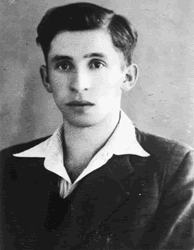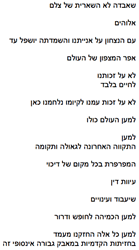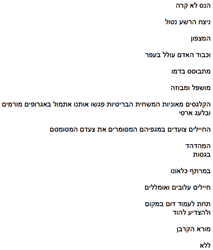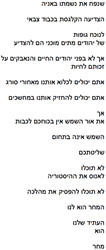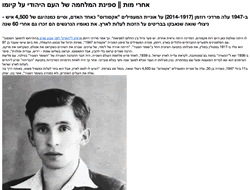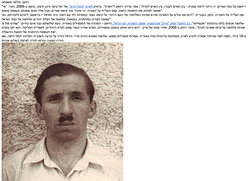Mordechai Rosman, a leader of the refugees
(1917 Stolin- 2014 Israel)
60 years later, veteran rues loss of 'Exodus spirit'
By Lily Galili 2007
As a teenager in Poland, Roseman was a key member of the Zionist-socialist youth movement Hashomer Hatza'ir [in training in Cz?stochowa in 1936 and later, as the war started, he escaped to Vilna (1939 - 1941) After the Nazis attacked Lithuania in June of 1941, he escaped east, deep into the Soviet Union.] He organized underground cells, helped forge certificates for immigration to Palestine, worked underground in the Soviet Union during World War II, was arrested and imprisoned, directed the Brichah organization, which helped smuggle Jews from the USSR to the free world to bring them to their homeland. Throughout, he dreamed of immigrating himself.
When he felt he had completed a chapter in his public mission, Roseman joined the Exodus as one of the illegal immigrants.
In July 1947, the young Mordechai Roseman boarded the "President Warfield," better known as the "Exodus." He set off as an illegal immigrant, and got off the boat two months later a leader. In between, Roseman and his 4,500 shipmates forged one of political Zionism's most powerful myths.
The story of the Jewish refugees yearning to reach their country, and deported by the British to camps in Germany, fired the world's imagination and sympathy in a way that an army of propagandists couldn't do today.
Those were different times, when Zionism was the most righteous national movement, when the state in the making was the great promise of safe refuge, and when the New Israeli was still supposed to look like Paul Newman, playing the legendary Ari Ben Canaan in the movie "Exodus." Sixty years on, not one of these promises has been fully realized.
We talked about this with Roseman this week at the nursing home on his kibbutz, Ha'ogen. At 88, he has not only preserved the ability to reconstruct the past with astonishing clarity, he can analyze the present with impressive coherence. Contrary to accepted practice in these parts, his world is not black and white, but complex and richly nuanced.
Even when speaking about the British, he recalls being thankful at the time that the conflict was with them, not with the rulers of another people, because "the British have clear boundaries." It was the same when he was asked to define the three British deportation ships that were branded "floating Auschwitz."
"That was hyperbole drafted then for political reasons," he says, dismissing the comparison. "It was hard, but it wasn't Auschwitz."
He permits himself just one comparison of his own: "If the spirit of Exodus were pervasive here today, the country would look different. There is a large gap between the dream and reality."
That gap is only growing. The "Exodus spirit" of solidarity - egalitarian, united in a shared yearning - has never seemed more distant from the divided country of today. Maybe that is why the 60th anniversary of the Exodus is being celebrated with such fanfare.
"I can reconstruct every detail, but it would make for a story in a language with another sound," he says, indicating the limitation of words. "I say 'we boarded the ship,' but we actually floated on the wings of eagles. It was a tremendous drama - between man and his past, between man and his destiny."
In retrospect, he says that the 4,500 people on the Exodus appeared "half mad" to an outside observer. In practice, he stresses, the harsh conditions were tolerable, and the long-suffering passengers knew how to contend with them. Their showdown with the British was expected, and inevitable, as was the refusal to let them into the country, and nobody really believed that the tin cans and potatoes the immigrants prepared as ammunition would do the job.
However, Roseman emphasizes that it was not the killing of three passengers that prompted Skipper Yossi Harel to hand the ship over to the British; it was the prognosis by the ship's medical service that several of the injured were in mortal danger. To this day it is not known who fired the bullets that killed three passengers. "Whoever knows isn't telling, and whoever tells, doesn't know," Roseman summed up.
When the deported Exodus survivors finally arrived at the camps in Germany, having refused to disembark at Port-de-Bouc, France, they organized quickly. They set up synagogues and kindergartens, and received aid from The American Jewish Joint Distribution Committee. Realizing even then that they had made history, they issued special certificates for Exodus passengers so future impostors would not be able to claim they were there.
On the day the State of Israel was declared, Roseman flew there onboard a plane belonging to the Haganah, the precursor of the Israeli army.
Sixty years, three kids, seven grandchildren and seven great-grandchildren later, he says the dream was greater than the reality. He'll say the rest of his piece tonight at a gathering in Tel Aviv to mark the Exodus' 60th anniversary. He knows that not everyone will want to hear it, but also says he must unburden himself.
Tamara Traubmann reports: Tonight's gathering will bring together for the first time all surviving Exodus veterans. The event is being organized by Meir Schwartz, who commanded one of the three ships used to deport the immigrants to displaced persons camps.
"There will be singing, speeches, maybe the president of Israel will come. We want to hand out medals to the illegal immigrants. But the main purpose of this event is to give them thanks," Schwartz said. "They withstood harsh conditions for a long time, but they were never given thanks for their contribution to the state's establishment, and they made a major contribution. The world woke up when they were forcibly disembarked at Hamburg. A month later the English gave up their mandate over Palestine."
The gathering, to be held at the old Beit Lessin building near Dizengoff Square, will also be an attempt to put together a list of the 4,500 passengers. So far, Schwartz has managed to come up with 2,100 women and men.
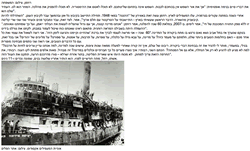
By August 1945, roughly fifteen thousand Maapilim had reached Italy.
--
The captain of the legendary pre-state Jewish immigrant ship Exodus, Yitzhak "Ike" Aharonovitch, died yesterday in Hadera at the age of 86.
The Exodus earned its place in the country's collective history as a ship carrying Holocaust survivors, which in 1947 tried to run the blockade that the British has imposed on Palestine at the time to bar free Jewish immigration to the country.
The ship left France in July of that year with 4,515 Holocaust survivors on board. After two months of run-ins with the British, its passengers were returned to France; when they refused to disembark there, they were deported to Hamburg, Germany.
Aharonovitch's leading role in the story of the Exodus was shared with the ship's commander, Yossi Harel, who died a year and a half ago at the age of 90. Aharonovitch was born in Germany and came to Palestine as a child in 1932 with his family. At the age of 17, he stole away on a ship and sought to join the Soviet army to fight the Germans, but he was caught and returned to Palestine.
He later joined the Palyam, the naval unit of the pre-state Palmach Jewish military force. He went to London to study seamanship, but returned to Palestine without completing his studies to get involved in bringing in illegal Jewish immigrants.
In 1946, he boarded the Exodus in Baltimore and worked on the ship's renovation. When the ship's captain resigned, Aharonovitch, then 23, assumed the post.
The ship had begun its life as an American pleasure boat. The Exodus became a symbol of the effort to bring immigrants to Palestine following prolonged battles against the British along the coast of the country. Eventually the decision was made to surrender, and the ship was allowed into Haifa harbor in the presence of members of the United Nations commission on Palestine before the passengers were expelled to Germany.
Aharonovitch was an advocate of the need to fight the British and never forgave the decision to surrender, which he attributed to David Ben-Gurion, later Israel's first prime minister. According to Aharonovitch's daughter Ella, Ike believed that it would have been possible to successfully bring the ship's passengers onto shore.
Mordechai Rosman, a leader of the passengers on the ship Exodus , told Haaretz that "Ike was a phenomenon, one of the central figures in the illegal Jewish immigration effort. The Exodus was not the first or last of the immigrant ships during that period. Its prominence is attributable to the large number of passengers that it was carrying and the fact that its professional crew was Jewish and not foreigners. He was shown to be a fascinating figure. He charmed those around him, with his calm, his determination and his devotion. The jewel in the crown among his accomplishments was the Exodus."
